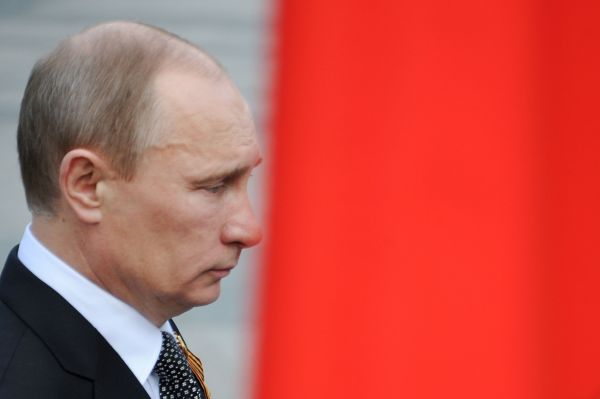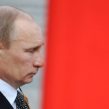
Putin Cannot Go to Camp David
Publication: Eurasia Daily Monitor Volume: 9 Issue: 91
By:

Instead of marking a closure for the turbulent period of ugly elections, Vladimir Putin’s presidential inauguration opened a new phase in the political crisis in Russia. The activities have centered again on Moscow where the heterogeneous opposition finds it remarkably easy to mobilize thousands of supporters and where the resonance from every rally is instant and powerful. Putin’s staff decided not to take any chances and closed downtown Moscow not just to traffic but also to all pedestrians, creating the impression of an entirely isolated self-appointed “elite” gathered behind the Kremlin walls (Novaya Gazeta, May 8). This isolation brought on a fear of eroding control, which translated into the order to get tough with the pesky protesters. Putin’s spokesman, Dmitri Peskov, interpreted this order as “smearing their liver over asphalt” (Moscow Echo, May 11). These words most probably came directly from the mouth of his coarse-talking boss.
The police deployed at maximum strength indeed behaved with deliberate brutality against the May 6 rally, beating and detaining hundreds of “white ribbons” and greatly increasing the risk of a violent escalation because further protests could turn much angrier (Kommersant, May 10). What has happened instead is a spectacular growth of demonstratively peaceful flash-mobs, street choirs or open-air debates, culminating in an improvised “occupy” movement in the Chistye Prudy Boulevard (Gazeta.ru, May 11). The riot police looked ridiculous as they detained teenage girls dressed as pigs on the suspicion that their street party was a form of protest. By the middle of the week, the police has essentially given up with chasing the malcontents (Vedomosti, May 12). That granted an opportunity to a group of writers to initiate a “test walk” along the boulevards last Sunday, intended to demonstrate that people have the undeniable right to walk the streets of their city and express any opinions about the authorities. Many thousands of readers showed up to join in (Newsru.com, May 13).
Against the background of these dramatic developments in Moscow, Putin made the surprise decision not to go to the G8 summit at Camp David on May 18-19 and to send the newly-confirmed prime minister, Dmitri Medvedev, in his stead. Putin’s reasons are not clear, but the official explanation that he needs to concentrate on forming a new Cabinet does not hold water since it is Medvedev’s job to select ministers and their deputies (Moskovskie Novosti, May 11). Speculations about hidden agendas are proliferating in Moscow; yet, it is rather improbable that Putin would have skipped the event just to snub US President Barack Obama or to show disdain for the ever-deepening financial mess in the EU (Kommersant-FM, May 11). He used to be rather fond of this privileged club of Western leaders and quite probably had been looking forward to re-joining it from a position of strength – or maybe even superiority as compared to his weakened counter-parts from France or Italy (Gazeta.ru, May 11). Coming to the high-profile event as a “weakling” who had lost control over the streets of Moscow, however, was out of the question.
Putin was ready to bring Minsk to Moscow and to assume temporarily the dictatorial role of Aleksandr Lukashenko – but it has not quite turned out this way because the protesters in Moscow were neither scared of the thousands of battle-ready riot policemen nor eager to respond to provocations with violence. The situation is fluid. The Moscow authorities are keeping a low profile and Putin again finds himself in a most uncomfortable situation with no clue about what will happen next. His best chance is perhaps to exploit the differences in the motley crowd of the “white opposition” where the Left Front, led by charismatic Sergei Udaltsov, advocates views that are quite foreign to the liberal urban middle classes. Udaltsov was detained in the course of the May 6 clashes together with Aleksei Navalny, a well-known anti-corruption blogger, and both are still behind bars. This effectively makes them into heroes of the budding “uprising” (Moscow Echo, May 12). At the same time, Mikhail Prokhorov, who came third in the presidential elections by personifying a liberal alternative to Putin, has opted for abstaining from the “madness” of protests and escaped from the political arena (Snob.ru, May 11).
The lack of leadership in the liberal camp is nothing new, but there are many voices there that command attention. Several of them have joined with the former finance minister Aleksei Kudrin who issued a statement through his Committee for Civil Initiatives, urging the authorities to ensure the safety of the opposition rallies (Kommersant-FM, May 12). Kudrin insists that mass street protests are helpful in proving the need for further political changes and economic reforms to the power holders and Russian society. Many in Putin’s elite feel the urgency of this need, but every reform they think up runs into conflict with some fiercely guarded parochial bureaucratic interests and ends up as a hollow simulation (Novaya Gazeta, May 12). The official discourse emphasizes the benefits of and the choice for “evolution.” Most participants in the “walk with the writers” demonstration would probably agree with that. In real terms, however, the fake reforms that the government is drafting mean stagnation, and the majority of the “creative class” finds this prospect both revolting and alarming (New Times, May 12).
Putin was prepared to showcase his brutal resolve and to reject international criticism off-hand. Yet, by refusing to pick up the fight, the opposition has made him look preposterous – he might find the international reaction to that rather hard to swallow. Because Putin is avoiding Camp David, his first foreign visit will be to China. This rising giant is very sensitive to “losing face,” which is exactly what is happening with Putin’s over-blown profile. The situation may be becoming intolerable to Putin. Meanwhile, the Moscow riot police is probably becoming fed up with being on the high alert and with trying to strike fear into the crowds, which are celebrating their liberation from Putinism.




